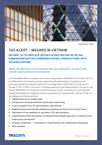
Tax alert - Decree 132 on tax administration for companies having transactions with related parties
Decree 132 on new transfer pricing regulations
In comparison with preceding regulations on transfer pricing (“TP”) (including Decree 20/2017/ND-CP (“Decree 20”), Circular 41/2017/TT-BTC (“Circular 41”) providing guidance on the implementation of Decree 20, and Decree 68/2020/ND-CP (“Decree 68”) amending Article 8, Clause 3 of Decree 20 on loan interest expense deductibility for companies that have transactions with related parties), Decree 132 has the key changes summarized as below:
1. Tightening the arm’s-length range
Previously according to Decree 41, the arm’s-length range is established by the interquartile range as a range of values from the first quartile to the third quartile (i.e. from the 25th percentile to the 75th percentile). However, Decree 132 shall tighten this range to a range of values from the 35th percentile to the 75th percentile.
2. Clarifying the business-individual related party relationship
Article 5, Clause 2, Point l of Decree 132 provides clarification on the related party relationship between a company and individuals of management and controlling relationships, or of close family relationships (as detailed at Article 5, Clause 2, Point G of the Decree) as below:
- The company and such individuals are considered as related parties, if they enter into the transaction of transferring at least 25% of the owner's contributed capital of the company in the taxable year; or
- The company and such individuals are considered as related parties, if they enter into the transaction of borrowing or lending at least 10% of the owner’s contributed capital of the company at the time of the transaction.
3. A new exemption from TP documentation requirements
According to Decree 132, companies which are exempted from the TP declaration in Section III and IV of Appendix 01 shall also be exempted from preparation obligation of the TP documentation, provided that all the below conditions are met:
- Taxpayers only engage in transactions with related parties in Vietnam who are subject to Corporate Income Tax (“CIT”); and
- Taxpayers and their related parties are subject to the same CIT rate; and
- Neither party enjoys CIT incentives during the relevant tax period.
4. Supplementing and amending obligations regarding the Country-by-Country Report
For taxpayers having a Vietnamese Ultimate Parent Entity (“UPE”):
- Similar to Decree 20's regulations, groups with global consolidated revenue in the relevant tax period of VND 18,000 billion or more must prepare the CbCR;
- Decree 132 stipulates that the CbCR must be submitted no later than 12 months from the financial year end of the UPE.
For taxpayers having an overseas UPE:
- In case the UPE is not obligated to submit the CbCR in its jurisdiction of residence, Article 18, Clause 5, Point đ of Decree 132 provides that “international tax treaties shall apply”. It can possibly be interpreted that the Vietnamese taxpayer is not obligated to submit the CbCR in this case. However, this Point remains unclear and awaits further guidance from the tax authority.
- In case the UPE is obligated to submit the CbCR in its jurisdiction of residence:
- If there is the Automatic Exchange of Information (“AEoI”) between Vietnam and the UPE’s jurisdiction of residence, in accordance with the International Tax Agreement or the Multilateral Competent Authority Agreement (“MCAA”), the CbCR will be automatically exchanged to the Vietnamese tax authority.
- If there is no aforementioned AEoI between Vietnam and the UPE’s jurisdiction of residence, or the AEoI has been suspended, the Vietnamese tax payer must submit the CbCR to the tax authority. In specific, Article 18, Clause 5, Point b of the Decree sets forth regulations on this case as follow:
- The jurisdiction of residence of the UPE has signed an International Tax Agreement with Vietnam but there is no MCAA for AEoI in place at the time of the CbCR submission deadline under the provisions of Point a of this clause;
- The jurisdiction of residence of the UPE has joined the MCAA with Vietnam but suspended the AEoI or cannot automatically provide the CbCR to the Vietnamese tax authority.
In case the multinational group has more than 01 taxpayers in Vietnam and the overseas UPE provides a written notification that appoints one of the Vietnamese taxpayers to submit the CbCR then the appointed taxpayer is obligated to submit the CbCR to the tax authority. The taxpayer must submit the UPE’s written notification to the tax authority no later than the financial year end of the UPE.
However, the provision at this Point b will not be applicable if the conditions at Article 18, Clause 5, Point c are satisfied.
- In case there is no International Tax Agreement between Vietnam and the UPE’s country of residence, guidance on the taxpayer’s obligation regarding the CbCR submission remains unclear and awaits further guidance from the tax authority.
5. Amendment to the deadlines for provision of TP documentation
Decree 20 stipulates that in case of a tax audit, taxpayers have a maximum time limit of 15 working days from the date of receiving requests from the tax authority to provide the TP documentation. However, Decree 132 will abolish this provision, referring such deadline to the deadline provided in the Law on Inspection.
If TP documentation is requested during the consultation period preceding a tax audit, Decree 132 shall make no change to the deadline for providing TP documentation as previously prescribed in Decree 20, i.e. no more than 30 working days from the date of receiving written requests from the tax authority. If supported by legitimate reasons, the above time limit can be extended once for no more than 15 working days.
6. Inheriting Decree 68's provisions on deductible loan interest expense for companies with related party transactions
Decree 132 inherits provisions on deductible loan interest expense for companies with related party transactions from Decree 68. Among these inherited provisions, the deadline for submitting revised CIT finalization dossiers for CIT periods 2017 and 2018 as provided at Decree 68 Point 2 Article 2 of Decree 68 is kept by Decree 132. Specifically, taxpayers who are able to deduct additional interest expense as a result of applying the new interest deductibility cap must submit the dossiers to the tax authority before 01 January 2021.
For more detailed information about the aforementioned provisions on deductible loan interest expenses, please refer to Mazars' July Tax Alert - Decree 68 on the deductibility of interest expenses.
7. Changes in Appendix I – Information on related parties and related party transactions
Compared to Form No. 01 issued with Decree 68, Appendix I issued with Decree 132 supplements Line (9.1.a) - Deductible interest expense during the period and Line (9.1.b) - Non-deductible interest expense in the period that is carried forward to the next period.
8. Other changes
- The scope for selection of comparables for benchmarking analysis by geographical market: Decree 132 requires that the selection of local comparables should be prioritized over comparables in the same region, which is similar to regulations under Decree 20. However, for the selection of domestic comparables, Decree 132 introduces a more specific guidance which is “in the same locality, the same provincial area, the same country”.
- Middle value: Decree 20 and Circular 41 introduce the term "middle value" which refers to values within the arm’s-length range. However, this term could possibly be confused with the median value. Therefore, Decree 132 will replace the term "middle value" by a more direct term - "a value within the arm’s-length range".
Decree 132 takes effect from 20 December 2020 and is applicable to CIT period 2020 onwards, replacing Decree 20 and Decree 68.
OUR SUPPORT
We do trust the above points are notable and sufficient, but should you have any questions or need a deeper discussion on this issue, please do not hesitate to contact us.
Download full issue in English and Vietnamese below |






